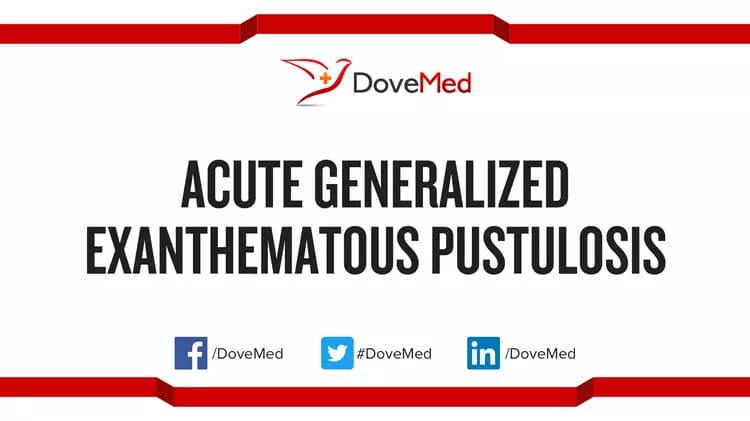What are the other Names for this Condition? (Also known as/Synonyms)
- AGEP (Acute Generalized Exanthematous Pustulosis)
What is Acute Generalized Exanthematous Pustulosis? (Definition/Background Information)
- Acute Generalized Exanthematous Pustulosis (AGEP) is a rare type of allergic skin condition which presents with a skin eruption. It is believed to be caused by a reaction to certain medications
- The condition begins with a rash, typically on the face, in the armpits, or groin, and may be associated with fever and malaise
- Acute Generalized Exanthematous Pustulosis can occur across all age groups, and is triggered by exposure to certain antibiotics, oral antifungal medications, or analgesics
- Viral infections may initiate the condition in children. In rare cases, AGEP may be induced by bacterial infections or spider bites as well
- Topical corticosteroids and moisturizers, and oral antihistamines are used to relieve the symptoms of Acute Generalized Exanthematous Pustulosis. However, these medications are only known to bring about varying degrees of success
- Acute Generalized Exanthematous Pustulosis is not generally preventable. But, this skin condition is reported to resolves in 1-2 weeks, followed by peeling of the skin, which then heals
Who gets Acute Generalized Exanthematous Pustulosis? (Age and Sex Distribution)
- Acute Generalized Exanthematous Pustulosis is a condition that affects individuals of all ages
- Viral infections are known to trigger AGEP in children
- The condition affects both males and females
- All racial and ethnic groups are at risk and the condition is observed worldwide
What are the Risk Factors for Acute Generalized Exanthematous Pustulosis? (Predisposing Factors)
A major risk factor for developing Acute Generalized Exanthematous Pustulosis is the use of certain medications, such as:
- Antibiotics belonging to the beta-lactam or tetracycline class
- Sulfonamides
- Oral antifungal agents
- Hydroxychloroquine
- Carbamazepine
- Paracetamol
In children, exposure to certain viruses is considered a key risk factor.
It is important to note that having a risk factor does not mean that one will get the condition. A risk factor increases one's chances of getting a condition compared to an individual without the risk factors. Some risk factors are more important than others.
Also, not having a risk factor does not mean that an individual will not get the condition. It is always important to discuss the effect of risk factors with your healthcare provider.
What are the Causes of Acute Generalized Exanthematous Pustulosis? (Etiology)
The exact cause of Acute Generalized Exanthematous Pustulosis is not entirely understood, but there is strong evidence to suggest that in a majority of cases, the condition occurs due to exposure to medications such as the following:
- Antibiotics belonging to the beta-lactam family
- Tetracycline class of antibiotics
- Sulfonamides
- Oral antifungal agents such as terbinafine
- Anti-parasitic drugs such as hydroxychloroquine (used for treatment of malaria and lupus)
- Anticonvulsants such as carbamazepine
- Certain analgesics (such as paracetamol)
Studies suggest that the above drugs induce an increase in drug-specific T-cells in affected individuals, specifically, the CD4+ T-cells. These cells are a type of white blood cells that are crucial to the body’s immune response.
In rare cases, the following may trigger an immune reaction in individuals, causing AGEP:
- Spider bites
- Bacterial infections (such as Chlamydia pneumoniae infection)
- Viral infections (particularly in children)
- Recurrent urinary tract infections
What are the Signs and Symptoms of Acute Generalized Exanthematous Pustulosis?
The signs and symptoms of Acute Generalized Exanthematous Pustulosis may include the following:
- Multiple pustules on the face, armpits, and groin
- Small blisters with white/yellow fluid
- Fever and malaise (feeling of illness)
- Facial swelling
The onset of the condition usually occurs within two days of exposure to certain medications.
How is Acute Generalized Exanthematous Pustulosis Diagnosed?
Typically, no laboratory studies are necessary to make a diagnosis of Acute Generalized Exanthematous Pustulosis. Healthcare providers may suspect the skin condition during a clinical observation of the child.
However, if deemed necessary, the following tests may be undertaken:
- Bacterial and yeast cultures
- A KOH test in which a scraping is examined microscopically looking for yeast or fungal organisms
- A tissue biopsy may be performed to confirm a diagnosis and rule out other skin conditions such as atopic dermatitis
- Patch testing may also be performed to confirm an allergy
Many clinical conditions may have similar signs and symptoms. Your healthcare provider may perform additional tests to rule out other clinical conditions to arrive at a definitive diagnosis.
What are the Possible Complications of Acute Generalized Exanthematous Pustulosis?
There are no major complications associated with Acute Generalized Exanthematous Pustulosis, if the medication triggering the condition is discontinued.
How is Acute Generalized Exanthematous Pustulosis Treated?
Acute Generalized Exanthematous Pustulosis is treated best by discontinuing the medication triggering the condition. The affected individuals often experience a worsening of symptoms, if they continue to use the medication that triggered AGEP.
Additionally, the use of the following medications may be recommended, to help reduce the symptoms of Acute Generalized Exanthematous Pustulosis:
- Moisturizers
- Topical corticosteroids
- Oral antihistamines
How can Acute Generalized Exanthematous Pustulosis be Prevented?
- Currently, there are no known measures to prevent Acute Generalized Exanthematous Pustulosis
- Avoiding medications similar to the one that caused the condition can help prevent its recurrence
What is the Prognosis of Acute Generalized Exanthematous Pustulosis? (Outcomes/Resolutions)
The prognosis for Acute Generalized Exanthematous Pustulosis is good, since the condition typically resolves within 10 days, following discontinuation of the triggering medication.
Additional and Relevant Useful Information for Acute Generalized Exanthematous Pustulosis:
Please visit our Allergy Health Center for more physician-approved health information:
Related Articles
Test Your Knowledge
Asked by users
Related Centers
Related Specialties
Related Physicians
Related Procedures
Related Resources
Join DoveHubs
and connect with fellow professionals



0 Comments
Please log in to post a comment.